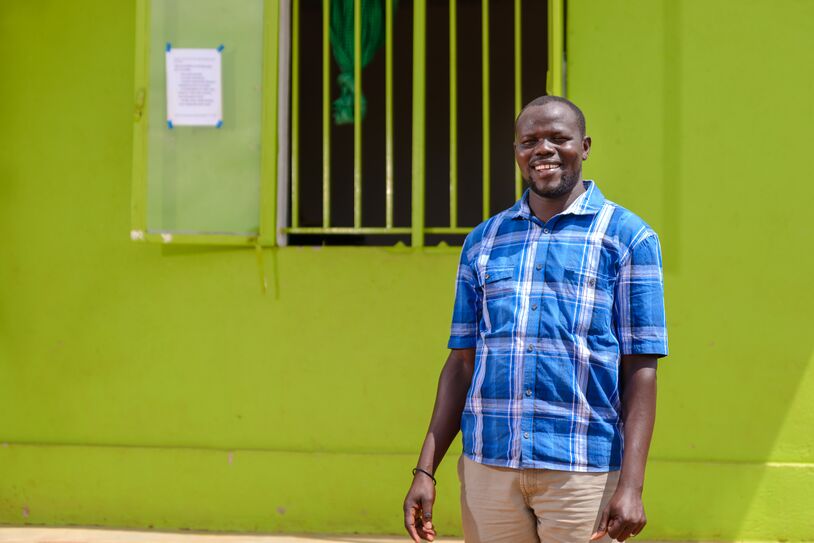Providing Access to Energy in Displacement Settings: Experiences from Ofua Village, Rhino Camp Refugee Settlement
Approximately 840 million people around the world live without electricity of which half are in Sub-Saharan Africa. In Uganda only 41.3% of the total population have access to electricity.
The villages of Rhino Camp Refugee Settlement are not connected to the national grid, dispersed and roughly 60-90 km away from the nearest town of Arua at which energy related services and products are available. Rhino Camp hosts approximately 130,000 refugees, registered as of September 2021, and nearly 25,000 Ugandan families live in surrounding villages.
iCON ELECTRONICS REPAIR CENTRE (iCON), operational since May 2021, has been established to bring these highly needed energy-based products and services closer to the community. It is one out of two energy kiosks, with solar-powered electricity, constructed by GIZ project Energy Solutions for Displacement Settings (ESDS)1 in 2020/2021. Both kiosks are managed by local community groups consisting of refugees and host community members. A community group ideally comprises a chairperson, vice chairperson, treasurer, general secretary, vice secretary, monitoring team and sub-financial committee. iCON has a total of 12 members, including a chairperson and two computer training instructors (5 female, 7 male || 2 Ugandan Nationals, 10 South Sudanese).

Energy Kiosk Model
iCON is strategically placed in the buzzing Luruja Trading Center in Ofua Zone to attract customers, and thereby improving access to sustainable energy products for refugee and host communities. It has thus far had a monthly average sale of about 5-6 improved cook stoves (ICS) and 5-6 solar lights. Members of the energy kiosk group also travel to surrounding villages twice a week, like “mobile sales agents”, reaching both host (Ochodi Market) and refugee (Omoga 4 Market) communities. These mobile sales agents mostly use boda bodas (motorcycle taxis) for transportation and herein lies one of the biggest challenges, says Peter. Transportation costs are expensive at a constant UGX20,000 (USD5.5) and need to be paid even if sales have not been made. Apart from the above mentioned, the kiosk also sells cold drinks (~600units/month) from a solar-powered fridge and offer phone charging services (~1100units/month), both very popular in demand. They also sell phone accessories, offer phone repairs and secretarial services. Whenever the inventory needs restocking Peter calls his suppliers and they deliver to the kiosk. This has been one of the successes in bringing quality ICS and solar products and services closer to households and productive users of energy – a reason for suppliers to travel out that far, thereby strengthening local distribution chains.
One of the biggest accomplishments is the provision of basic computer trainings which has had a total of 62 participants, with 6 on a waiting list when the interview took place in October 2021. The training consists of a three months’ course on the basic use of Microsoft, is held by 2 certified instructors, and costs UGX180,000 (USD50) per person. Sessions are conducted from Mondays to Fridays in 2-hour slots with 4 participants at a time because only 4 laptops are available. Participants are required to be proficient in the English language, since it is the language of instruction. On Saturdays, participants are welcome to practice on their own. Most of the participants are refugees from South Sudan and Sudan above 18 years old, however exceptions are made for advanced English-speaking teens. The biggest challenge faced here is securing a reliable and affordable internet connection.
Peter refers advanced participants to other computer shops within the trading centre for routine practice and getting involved in commercial packages of music loading, videography, graphics, among others. The participants also receive clients who are interested in type setting and printing services. They use the kiosk facilities to carry out these services at a fee of UGX500 (USD0.15) per page paid to the kiosk. Participants also use the facility for online job applications to organisations both within and out of the settlement. Some have already been employed by organisations within the area, for example as training of trainers at Green Relief Initiation Youth Skills, an orphanage within Rhino Camp.
Indeed, iCON promotes employment and contributes to income generation, endorses women and youth empowerment. Not only has the kiosk itself become a source of income for its 12 members, but it also enables others to pursue livelihood enhancing activities, such as ICS for productive use, or IT skills received through computer training for job applications leading to employment.




















